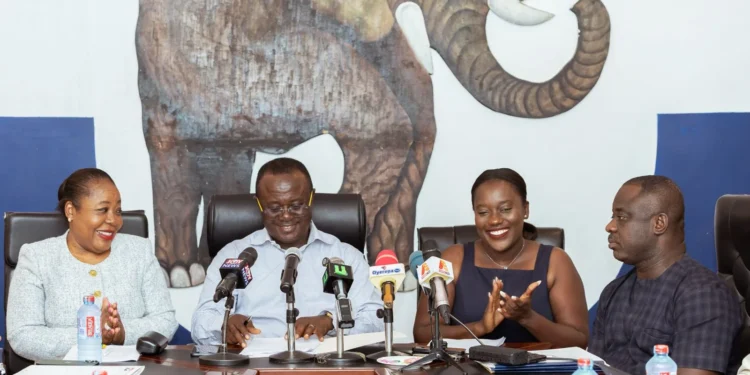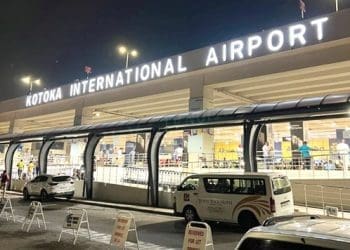Chairperson of the New Patriotic Party (NPP) USA branch, Yaa Frimpomaa Amponsah, has sharply condemned the party’s decision to uphold the ban on proxy voting ahead of the 2026 presidential primaries.
Her criticism follows the dismissal of petitions submitted by students and diaspora members by the Chairman of the NPP’s Presidential Elections Committee, Joe Osei Owusu. These petitions challenged the decision to block proxy voting in the upcoming primaries.
Osei Owusu maintained that the restriction is essential to preserve the credibility and orderly conduct of the polls scheduled for January 31, 2026.
Addressing the media, he explained that although the committee had thoroughly reviewed all appeals, permitting proxy voting could complicate the process and potentially lead to disputes.
“We’ve read the petitions presented by sections of the party, and after listening to all that, we came to the conclusion that for the sake of conducting an election that is incident-free and credible, that provision should be maintained,” he stated.
“We will still not have proxy voting in the 2026 presidential primaries.”
Meanwhile, the party faces mounting internal pressure as a coalition of its constituency executives abroad has threatened legal action if the ban is not lifted.
Their petition accused the party’s National Executive Committee (NEC) of breaching both the spirit and letter of the NPP Constitution, warning that the refusal to allow proxy voting could spark a damaging internal legal confrontation.
The petition, endorsed by numerous constituency executives currently based overseas, cites Article 25(1)(b) of the NPP Constitution, which allows a registered voter who is “absent from the constituency and will be unable to vote on polling day” to apply for a proxy vote.
“The constitutional language is clear and unambiguous,” the executives contend, arguing that the party’s refusal to facilitate proxy voting for members abroad constitutes an act of “unconstitutional disenfranchisement.”
The situation places the party leadership in a delicate position. Allowing proxy votes may be interpreted as bowing to external pressure, potentially altering the dynamics of the primary race. Conversely, refusing the request risks a public legal dispute that could undermine the party’s image as a promoter of democratic values.
“This is no longer just an internal grievance; it’s a direct challenge to the party’s governance,” said Dr Evelyn Mensah, a senior lecturer in Political Science.
“A legal challenge would force a public dissection of the NPP’s constitution and force the judiciary to intervene in a purely internal party matter. This is a scenario every political party seeks to avoid, as it exposes deep internal divisions and sets a problematic precedent.”
The petitioners also highlighted the economic implications, arguing that the party—currently in opposition—should be conserving its resources.
They questioned the rationale behind compelling members abroad to spend “hundreds of thousands of dollars” on travel for a single vote when such funds could instead support grassroots mobilisation ahead of the 2028 general election.
Speaking on Accra-based Citi FM on Friday, November 21, 2025, Amponsah emphasised that proxy voting is a legitimate provision under Ghana’s electoral laws and should not be set aside for administrative convenience.
According to her, Regulation 25 of CI 127 clearly outlines who qualifies for proxy voting, including individuals who may be sick, vulnerable, disabled, or otherwise unable to be physically present for reasons beyond their control.
“Our position is simple. Proxy is a feature of an election that is enshrined in our laws. The framers of our laws and constitution were very clear that vulnerability can cause someone not to participate in the democratic process, so they made safeguards to protect such people,” she said.
She insisted that no internal party committee has the authority to override Ghana’s electoral statutes and warned that the ban risks disenfranchising many loyal members who legally qualify to vote by proxy.
Amponsah argued that safeguarding electoral integrity requires strict adherence to national electoral laws—not the convenience of party committees.
She noted that many dedicated delegates living abroad, studying, or working may be unable to travel to their polling centres but still deserve the right to participate.
“For you to sacrifice the statute on the altar of convenience, it has to protect the sanctity of what you are doing—not the sanctity of the people, the state, those who have travelled, those who are in school. They have the right under the law to exercise the franchise given to them. I think the committee is doing those people a disservice,” she added.
Her position stands in direct contrast to that of the Presidential Elections Committee, which maintains that the ban is necessary to guarantee a transparent, credible, and incident-free election.
As it stands, all delegates eligible to vote in the 2026 presidential primaries must do so in person.














